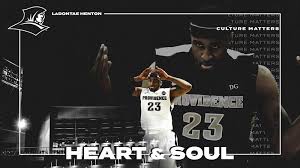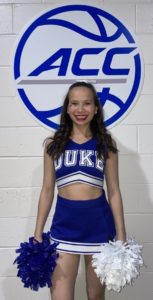It has been a Cinderella season for St. Peter’s: the Peacocks were 3-6 on Christmas Day and 12-11 in late-February, then won 3 games in 4 days to win the MAAC tourney. After receiving a #15 seed in the NCAA tourney they became the 10th #15 seed to upset a #2 seed, the 3rd #15 seed to advance to the Sweet 16, and the 1st #15 seed to ever make the Elite 8 before losing to North Carolina. However, they have also had some great players in the past such as Rich Rinaldi, who averaged 28.6 PPG as a senior in 1971 before being selected 43rd overall in the 1971 NBA Draft. HoopsHD’s Jon Teitel got to chat with Rich about scoring 54 PTS in a game and having several Hall of Fame teammates. Today marks the 51st anniversary of Rich getting drafted by Baltimore on March 29, 1971, so we take this time to reflect on his life/legacy.

In 1971 as a senior at St. Peter’s you scored a school-record 54 PTS in a win over St. Francis: was it just 1 of those scenarios where every shot you put up seemed to go in because you were “in the zone”? I missed my first 7 shots…but that did not deter me from shooting 35 more times(!), as I went 21-42 from the field. I had my worst game ever from the FT line (12-19) and 4 of my misses were on the front end of a 1-and-1. Once St. Francis heard that I was close to breaking the previous record (53 PTS by Tom Schwester the year before) they started triple-teaming me. Box-and-1 defenses were the norm when teams played against us during my senior year. Somehow I was able to make a FT with 18 seconds left for my 54th point. I missed the 2nd FT, fouled a guy on purpose, and then walked to the bench.
You averaged 21.5 PPG for your college career, which still ranks #3 on the school’s all-time list: what is your secret to being a great scorer, and could you have ever imagined that someone like Keydren Clark would come along and score over 3000 PTS? Freshman were ineligible to play on the varsity in my day. I started as a sophomore but only played half the time and averaged around 12 PPG. There is no secret to it: you just have to constantly be moving and attacking the defense. I ran a lot and ran fast. I tried to exploit whatever the defense was giving me and the rest I just took. Having a good outside shot and making your FTs is also vital. Someone always comes along to break a record and Keydren was a tremendous scorer…but 3000 points!? I would have never imagined that number.
Your team doctor at St. Peter’s was Anne Robbins: was it weird to have a female team doctor, and how did the players get along with her? It was weird initially but after a while it became the norm. We all got along with her: she was our doctor/friend. There was a tremendous respect for her and what she was doing and how she went about it.
In the summer of 1971 you were drafted in the 3rd round by Baltimore (1 spot ahead of Dave Robisch): did you see that as a validation of your college career, or the realization of a lifelong dream of reaching the NBA, or other? It was validation of my college career, although I was hoping that I would have been chosen higher than 43rd overall. My lifelong dream was to be a professional shortstop(!), but even though I took a detour somewhere along the line I have no regrets.
You had several Hall of Fame teammates in Baltimore (Elvin Hayes/Earl Monroe/Gus Johnson/Wes Unseld): what was it like being around such superstars, and who was the best NBA teammate you ever had? Being around such professionals was a learning experience for me: I just observed everyone and took it all in. When all was said and done, I learned not only professional basketball tips but tips about life and how to go about my business. Unfortunately it ended after 3 years for me, but I did incorporate what I learned from them, and those lessons have served me well for the last 4 decades. All of my teammates were good teammates: some were better than others but I can not single out just 1. Wes was a man of few words and led by example. He used to say to me before games, “Think about what you have to do, Rico.” That is all he would say so I would think about what needed to be done. It took more than just physical talent to succeed: I could run all night long and used both my God-given gifts and the skills that I developed through practice. However, if you did not think about your opponents’ tendencies, offensive schemes, etc., then you could get lost on the court and look like a fool. Wes made a young run-and-gun dude think about what he had to do: I still heed his advice. I was at a Wizards game recently and during the national anthem I looked up and saw the 4 retired numbers (Hayes/Unseld/Monroe/Johnson). It dawned on me that I was a teammate of each of them, which had a numbing effect on me. It was a privilege to be in the league for those 3 years.
In 1972 you made the playoffs before losing in 6 games to the Knicks: how close did you come to winning that series, and what is the biggest difference between the regular season and the playoffs? We were never really close to beating the Knicks during my time with the Bullets. They had home-court advantage and were a better team than us, having won more games than we did during the regular season. The intensity escalated during the playoffs,: I recall our playoff preparation practices vividly. Our practices were very intense as our 2nd team ran the Knicks’ offense. I cannot recall if I was Frazier or Monroe, but whoever I was I made sure to go hard at Archie Clark/Phil Chenier.
You scored a career-high 26 PTS on opening night of the 1972 season: how were you able to have such an amazing season debut, and what sort of expectations did that performance create for you? My 1st year was a learning experience and I rode the bench for most of the year. I came into the game mostly to foul people! It was a very humbling experience but a strategy that coaches used in those days. Clark was holding out in 1972 so I took advantage of the opportunity and started the 1st 26 games that year. Once he re-signed with us it was back to the bench for me.
In 1974 you ended up playing 5 games for the New York Nets en route to winning an ABA title: what was it like to play with Dr. J, and did they give you a ring even though you only played a few games? Watching Julius during my short stint with the Nets made my time there worthwhile: he did some amazing things. They did not give me a ring.
You currently work as a Career Counselor for the NBA Players Association to provide quality services and resources to help players achieve their goals both on and off the court: how do you like the job, and why is it so hard for some players to stay out of bad situations? It is a very gratifying job: I get to assist players as they make the transition from basketball to the real world. In my time here it has been very rewarding for me and the other counselors to see guys go back to school, get an internship, participate in our Business/Coaching/Broadcast programs, etc. The only players I can help are the proactive ones who want to help themselves. You eventually get a sense as to which guys will be okay and which guys will not. Bad situations occur when you think that you have too much money and that the paydays will never stop. You cannot keep the wrong company and have people around you who stymie your professionalism and your game. It is no joke when you get to this league: your college days are over. You cannot cheat the game by keeping crazy hours, not eating properly, and not getting your rest. For example, if a player makes $10 million in salary, ½ of that goes immediately to taxes, leaving him with $5 million to take care of his family/friends. When you are done playing, the divorce rate for pro athletes is 83%, so there goes another 50% of your money, with child support on top of that.
When people look back on your career, how do you want to be remembered the most? Whether I was the highest scorer or the last man on the bench, I would like to be remembered as a good teammate.








